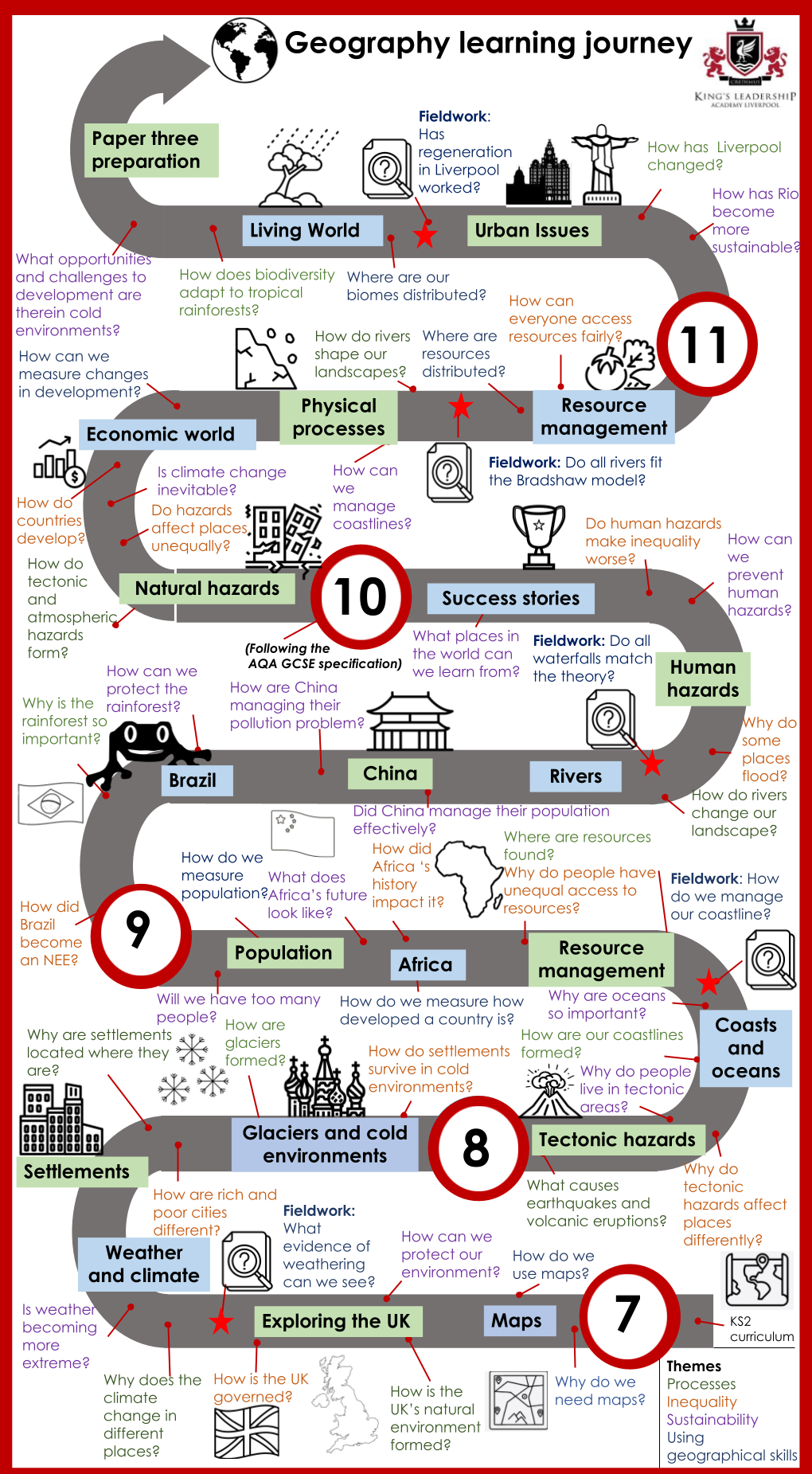- Home
- About Us
- Our Curriculum
- Subjects
- Geography
Geography
BackHead of Subject
Ms L Crew
Teaching Staff
Mr S Pughsley (Associate Vice Principal)
Ms G Fuller
Mr B Mathieson
Curriculum Rationale
Geography is like a compass, helping us navigate the vast and diverse world we live in. It takes us from towering mountains to wide oceans, from busy cities to quiet villages, showing how all these places are connected.
Through geography, we explore the natural forces shaping our planet, the cultures that flourish across different regions, and how people interact with their environments. It's more than just maps – it’s about uncovering the stories behind each place and understanding how they weave together to form the vibrant fabric of our global community.
KS3 (Years 7-9)
Year 7
Topics
Map skills- learning how to use grid references, scale and symbols.
Exploring the UK- explaining how our environment is unique and how we can protect it.
Weather and Climate- exploring how our weather and climate changes.
Settlements- describing how our towns and cities have grown.
Glaciers and cold environments - explain how glaciers form our landscapes.
Skills
Our first topic builds up the map skills we use throughout Geography, including using different types of maps. After this you will learn a range of skills teaching you to evaluate and research. We will have an opportunity to complete our first piece of fieldwork.
Year 8
Topics
Tectonic hazards- explaining how earthquakes happen and what damage they do.
Coasts and Oceans- describing how coastlines change over time and the value of our oceans.
Resource Management- explaining what a resource is and how we can use them sustainably.
Africa- explaining development and why Africa..
Population- exploring how our population is changing and how the planet can cope with overpopulation.
Skills
This year will teach you how to use a diagram to explain a process, including processes which cause earthquakes, floods and poverty. Geography teaches you many evaluative and critical thinking skills which will help you develop your employability.
Year 9
Topics
Brazil- exploring how Brazil’s history shaped it’s culture and how this impacts rainforests.
China- exploring China’s history and environment and how it has shaped the country it is today.
Rivers- Describing rivers and how they can cause flooding.
Human hazards- Analysing conflict, particularly in the Middle East.
Success Stories- Exploring those countries who have overcome a geographical problem.
Skills
This year focuses on case studies for some of the most interesting places on Earth; including China, Brazil and the Middle East. This will give you the skills to analyse and draw conclusions from the different aspects of a country's culture and environment.
Assessment
There is a summative assessment at the end of each topic consisting of an exam paper with 25 marks. There will be one short essay question on each.
GCSE (Years 10-11)
Topics
We follow the AQA specification at GCSE, the individual topics are:
Paper one
- Natural hazards (earthquakes, tropical storms and climate change)
- Physical processes (Rivers and coasts)
- Living World (Rainforests and cold environments)
Paper two
- Urban issues and challenges
- The changing economic world
- Resource management
Skills
A Geography GCSE equips you with valuable skills such as map reading, spatial awareness, and data analysis. It fosters critical thinking, problem-solving, and research abilities by examining global issues like climate change and urbanisation. These skills help in understanding environments, interpreting data, and making informed decisions about the world.
Assessment
The AQA GCSE Geography assessment consists of three written exam papers, covering physical and human geography, geographical skills, and fieldwork.
Paper 1: Living with the Physical Environment
-
Content:
- Natural hazards (tectonic, weather, and climate change).
- Ecosystems (tropical rainforests and hot deserts).
- UK physical landscapes (coasts and rivers).
- Marks: 88 (35% of GCSE).
- Duration: 1 hour 30 minutes.
Paper 2: Challenges in the Human Environment
-
Content:
- Urban issues and challenges.
- The changing economic world.
- Resource management (food, water, or energy focus).
- Marks: 88 (35% of GCSE).
- Duration: 1 hour 30 minutes.
Paper 3: Geographical Applications
-
Content:
- Issue evaluation (pre-release resource booklet).
- Fieldwork (questions based on students’ own fieldwork and unfamiliar contexts).
- Marks: 76 (30% of GCSE).
- Duration: 1 hour 15 minutes.
Clubs & Trips
Every year group will get a “fieldwork experience”, normally completed on a day trip.
Careers
Geography is a well known subject for its employability because it teaches you valuable skills like problem-solving, critical thinking, and understanding the world around us. It helps you make sense of the environment, different cultures, and how people and places are connected.
These skills are useful in many careers; from urban planning, environmental management, and conservation, to roles in business, travel, and tourism.
Geographers also work in mapping (GIS), climate science, and even government, where they help make decisions about sustainable development and resource management.
Geography gives you the tools to explore diverse career paths and make a real difference in shaping the future of our planet.
Homework & Revision
Homework
Feedback reponse sheets are issued every 2/3 weeks and will be glued into exercise books.
Key words are uploaded when we begin a new topic.
Revision
BBC bitesize is very useful
- KS3 Geography
- AQA Geography GCSE
All pupils are set up to use Seneca which helps test memory and provides quizzes.
There are revision summary sheets available for every topic, please request these from your class teacher.
Wider Reading
- travel books
- information about Geography A-level
- “No Logo” by Naomi Klein
- “Power of Geography” by Tim Marshall
- “Factfulness” by Hans Rosling
Learning Journey
